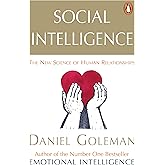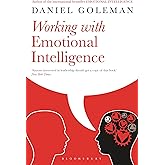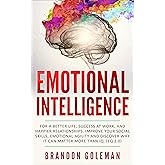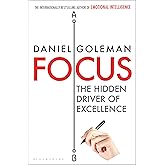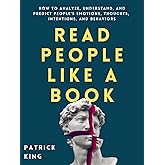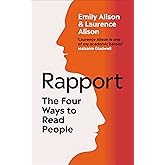These promotions will be applied to this item:
Some promotions may be combined; others are not eligible to be combined with other offers. For details, please see the Terms & Conditions associated with these promotions.
Your memberships & subscriptions

Download the free Kindle app and start reading Kindle books instantly on your smartphone, tablet or computer—no Kindle device required.
Read instantly on your browser with Kindle for Web.
Using your mobile phone camera, scan the code below and download the Kindle app.



 Audible sample
Audible sample Emotional Intelligence: Why It Can Matter More Than IQ Kindle Edition
Featuring a new introduction from the author
Does IQ define our destiny? In his groundbreaking bestseller, Daniel Goleman argues that our view of human intelligence is far too narrow. It is not our IQ, but our emotional intelligence that plays a major role in thought, decision-making and individual success. Self-awareness, impulse control, persistence, motivation, empathy and social deftness: all are qualities that mark people who excel, whose relationships flourish, who can navigate difficult conversations, who become stars in the workplace.
With new insights into the brain architecture underlying emotion and rationality, Goleman shows precisely how emotional intelligence can be nurtured and strengthened in all of us.
- LanguageEnglish
- PublisherBloomsbury Publishing
- Publication date20 July 2009
- File size1.1 MB
Explore your book, then jump right back to where you left off with Page Flip.
View high quality images that let you zoom in to take a closer look.
Enjoy features only possible in digital – start reading right away, carry your library with you, adjust the font, create shareable notes and highlights, and more.
Discover additional details about the events, people, and places in your book, with Wikipedia integration.
Customers who read this book also read
 In a very real sense we have two minds, one that thinks and one that feels.Highlighted by 7,678 Kindle readers
In a very real sense we have two minds, one that thinks and one that feels.Highlighted by 7,678 Kindle readers The fact that the thinking brain grew from the emotional reveals much about the relationship of thought to feeling; there was an emotional brain long before there was a rational one.Highlighted by 5,537 Kindle readers
The fact that the thinking brain grew from the emotional reveals much about the relationship of thought to feeling; there was an emotional brain long before there was a rational one.Highlighted by 5,537 Kindle readers People who are optimistic see a failure as due to something that can be changed so that they can succeed next time around, while pessimists take the blame for failure, ascribing it to some lasting characteristic they are helpless to change.Highlighted by 5,046 Kindle readers
People who are optimistic see a failure as due to something that can be changed so that they can succeed next time around, while pessimists take the blame for failure, ascribing it to some lasting characteristic they are helpless to change.Highlighted by 5,046 Kindle readers
Product description
Review
From the Back Cover
Through vivid examples, Goleman delineates the five crucial skills of emotional intelligence, and shows how they determine our success in relationships, work, and even our physical well-being. What emerges is an entirely new way to talk about being smart.
The best news is that "emotional literacy" is not fixed early in life. Every parent, every teacher, every business leader, and everyone interested in a more civil society, has a stake in this compelling vision of human possibility.
About the Author
@DanielGolemanEI
danielgoleman.info
Product details
- ASIN : B002ROKQNS
- Publisher : Bloomsbury Publishing
- Accessibility : Learn more
- Publication date : 20 July 2009
- Edition : 1st
- Language : English
- File size : 1.1 MB
- Screen Reader : Supported
- Enhanced typesetting : Enabled
- X-Ray : Enabled
- Word Wise : Enabled
- Print length : 369 pages
- ISBN-13 : 978-1408806203
- Page Flip : Enabled
- Best Sellers Rank: 18,372 in Kindle Store (See Top 100 in Kindle Store)
- 9 in Emotions & Mental Health
- 40 in Success eBooks
- 40 in Emotional Mental Health
- Customer Reviews:
About the author

DANIEL GOLEMAN is the author of the international bestsellers Emotional Intelligence, Working with Emotional Intelligence, and Social Intelligence, and the co-author of the acclaimed business bestseller Primal Leadership. His latest books are What Makes a Leader: Why Emotional Intelligence Matters and The Triple Focus: A New Approach to Education. He was a science reporter for the New York Times, was twice nominated for the Pulitzer Prize, and received the American Psychological Association's Lifetime Achievement Award for his media writing. He lives in Massachusetts.
Customer reviews
Customers say
Customers find the book informative, with one noting its well-researched content. The book receives positive feedback for its focus on emotional intelligence. Customers disagree on the book's readability.
AI-generated from the text of customer reviews
Select to learn more
Customers find the book informative, with one customer noting it is extremely well researched and provides plenty of data, while another mentions it includes a big list of references.
"This is a very interesting book which is thought provoking and also helpful in understanding how emotions can control a person rather than..." Read more
"...It has a big list of references and further reading for each of the chapters...." Read more
"Amazing book. A difficult read but very informative!" Read more
"...This unique 342 page book gives the reader plenty of data, presented in five parts...." Read more
Customers appreciate the book's focus on emotional intelligence, with one describing it as a psychological classic.
"...book which is thought provoking and also helpful in understanding how emotions can control a person rather than understanding what is going on...." Read more
"...down over 2000 years ago Daniel Goleman has written an important book on the human psyche and how people can influence the path of their lives by..." Read more
"...Such as "The Emotional Brain, The Nature Of Emotional Intelligence, The Nature Of Emotional Intelligence, Emotional Intelligence Applied,..." Read more
"...I wish all teachers would read it and be trained to teach emotional intelligence!" Read more
Customers have mixed opinions about the book's readability, with some finding it a must-read and interesting, while others say it is hard to read and boring.
"Good book thank you." Read more
"This is a very interesting book which is thought provoking and also helpful in understanding how emotions can control a person rather than..." Read more
"...I found it quite boring to read, so I ended up giving up on it." Read more
"...It has a big list of references and further reading for each of the chapters...." Read more
Top reviews from Australia
There was a problem filtering reviews. Please reload the page.
- Reviewed in Australia on 8 December 2024Verified PurchaseGood book thank you.
- Reviewed in Australia on 13 July 2014Verified PurchaseThis is a very interesting book which is thought provoking and also helpful in understanding how emotions can control a person rather than understanding what is going on. You have to read it to see that. It takes a lot of studying and it took me a long time to read it but I think it is very helpful for everyone.
- Reviewed in Australia on 21 April 2016Verified PurchaseThe book starts by quoting a challenge laid down by Aristotle in the Nicomachean Ethics:
"Anyone can become angry – that is easy. But to be angry with the right person, to the right degree, at the right time, for the right purpose, and in the right way – this is not easy."
From that challenge laid down over 2000 years ago Daniel Goleman has written an important book on the human psyche and how people can influence the path of their lives by attention to emotions. Goleman is a science writer who says he was dramatically influenced in 1990 by the work of two psychologists (John Mayer now at University of New Hampshire and Peter Salovey at Yale) who first formulated the concept they called “emotional intelligence”. Goleman set about a major study of research publications in psychology, neurology and childhood development. He published the first edition of Emotional Intelligence in 1996. It became a bestseller and has been reissued and revised several times.
As quite a few studies in the past 20 years have now shown, the brain does not have the fixed architecture, previously assumed. New technologies for brain imaging have revealed how the brain’s intricate mass of cells enables us to think, feel, imagine and dream. We also know that while each brain has a certain structure at birth – a genetic inheritance – that structure can change drastically depending on all the inputs during life’s journey. Most of those inputs have a strong emotional component.
It is surprising that “feeling” has been left out of much of the scientific research on psychology, but is now being clearly recognised that there are significant physiological changes with rising emotions.
There is much more in this book that can’t be covered in a brief summary. It has a big list of references and further reading for each of the chapters. There are some people who might feel it places too much emphasis on mechanical aspects of brain and body. But the reader is left with a feeling of hope for improved cooperation on this earth as more people recognise the importance of emotional intelligence.
- Reviewed in Australia on 13 June 2015Verified PurchaseAmazing book. A difficult read but very informative!
- Reviewed in Australia on 28 February 2020Verified PurchaseThis book is a must read, especially the first half. I wish I had read this 10 years ago.
- Reviewed in Australia on 10 July 2022Verified PurchaseI'm a self-help book groupie. I'm trying to read them all.
This one was so hard. I tried, I really did. I couldn't figure out the story that was being told. I couldn't extract the nuggets of "to-dos" vs things that would be disproven next paragraph. I'm assuming that it for better further in, but I didn't get there.
Also, the font is actually too small. It made it feel even more like a textbook (in a bad way).
- Reviewed in Australia on 2 March 2020Verified PurchaseGood book, worth to read.
- Reviewed in Australia on 31 December 2015Verified PurchaseAs this has been considered a psychological classic and it was on top 20 Amazon best sellers I to highly I'd buy it and check it out. I can see how this was a break through in 1995, but elements of the book are found in many different forms of literature now a days and what Daniel Goldman outlines is clearly the blue print for many books that come after his.
This unique 342 page book gives the reader plenty of data, presented in five parts. The chapter titles are indicative of where the author is leading the reader. Such as "The Emotional Brain, The Nature Of Emotional Intelligence, The Nature Of Emotional Intelligence, Emotional Intelligence Applied, Windows Of Opportunity, & Emotional Literacy."
Throughout the book he gives relevant and easy to understand examples that go over brain & cultural differences between the sexes, communication, genetics, etc to prove his premise that emotional IQ is often far more important in the individuals & groups success than the traditional intelligence exams can possibly measure.
Its an overall interesting read, though I'm not sure what we do with it. But it's seems obvious, I mean have not most of us known, or heard of people with high IQ's who behave badly due to their lack of emotional intelligence? Or people that have done well in life despite a non-impressive IQ/ academic record?
Top reviews from other countries
-
 Cliente KindleReviewed in Brazil on 3 February 2024
Cliente KindleReviewed in Brazil on 3 February 20245.0 out of 5 stars Leitura indispensável para a vida
Verified PurchaseÉ um livro fundamental para a vida de todos nós. Não é um best-seller de autoajuda, mas uma reflexão profunda, assertiva e baseada em pesquisas com rigor científico conduzidas por décadas. É uma leitura transformadora à medida que abre nossos olhos para verdades pouco difundidas ou completamente negligenciadas sobre inteligência emocional, cuja ausência propicia a maior parte dos problemas de relacionamento, de segurança e de saúde nas nossas sociedades contemporâneas.







